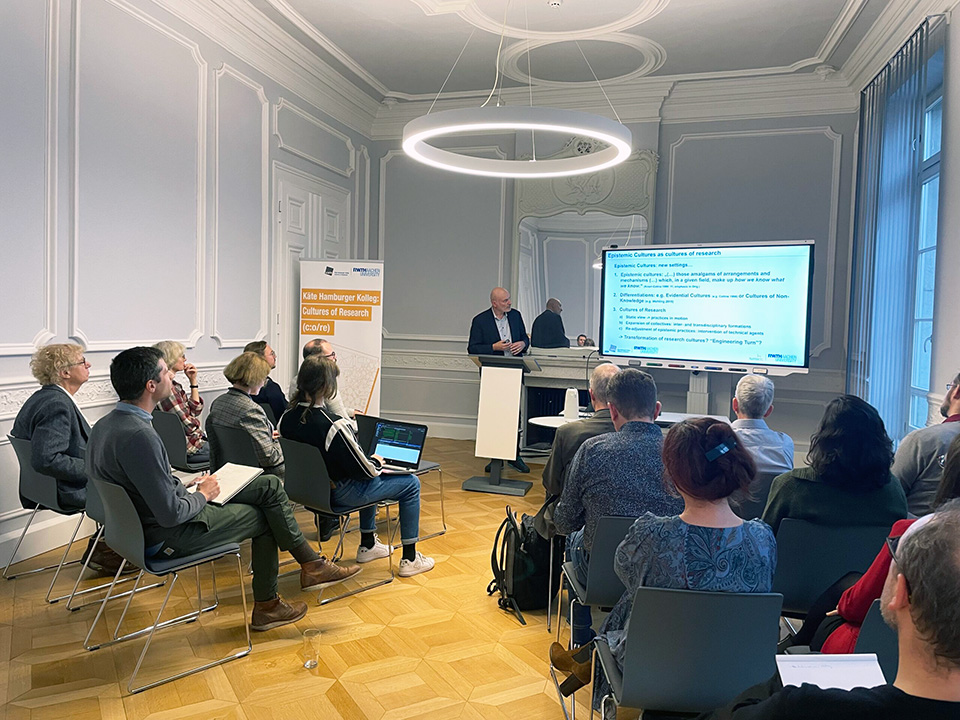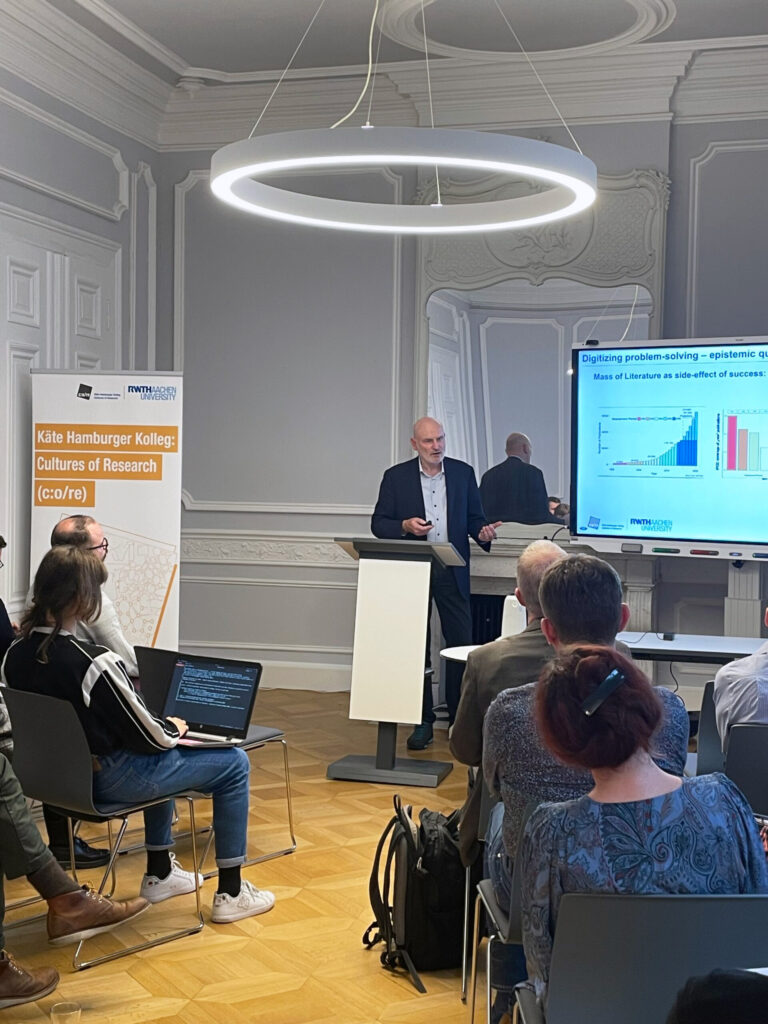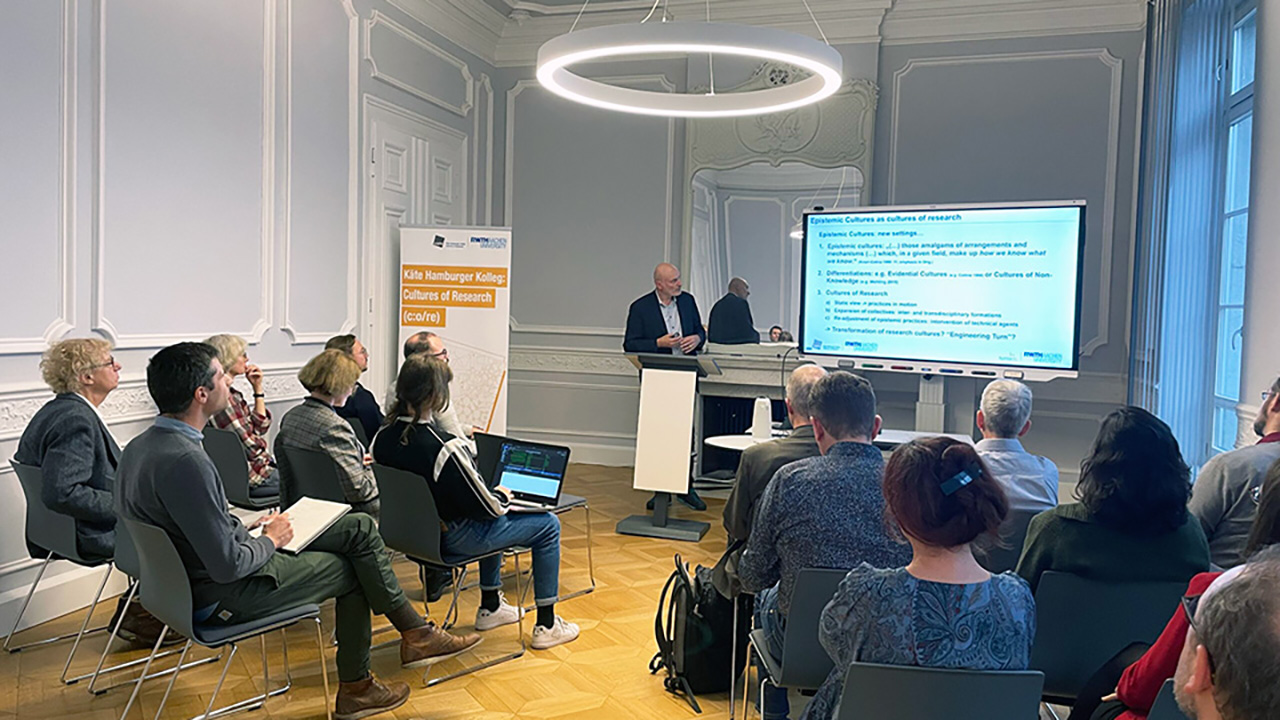MARCUS CARRIER
On October 9, 2024, KHK c:o/re director Prof. Dr. Stefan Böschen opened the new lecture series “Expanding Science and Technology Studies”. His talk titled “Towards Expanding STS?” was aimed at setting the scene for the lecture series and served as a starting point for further reflections on the topic. The talk was mostly designed around sketching out the problems that, as Prof. Böschen argues, classical Science and Technology Studies (STS) are not equipped to tackle alone. Instead, he argues for an expansion of STS towards other disciplines that investigate Science and Technology, namely History of Science and Philosophy of Science, to better grasp these problems.
Prof. Böschen started his talk with presenting his own personal starting points for thinking about this topic. First, there is the new concept of “Synthetica” or new forms of life that are designed by humans which also played a role in the opening talk by KHK c:o/re director Prof. Gramelsberger for the 2023/2024 lecture series “Lifelikeness”. Prof. Böschen now asked whether these Synthetica are epistemic objects or technical objects and if STS are equipped to describe the practice around them. Second, he talked about sustainable development goals. These are very knowledge intensive, but at the same time the knowledge management has to be done by different countries which also have to take into account different forms of knowledge and have to manage a lot of diversity in the system. Third, Prof. Böschen reflected on different formats he experienced that made him think further on expanding STS: The Temporary University Hambach that was designed around the structural change in the Rhinish Revier and based on the needs of local people, and the STS Hub 2023 in Aachen which was designed to bring together different disciplines doing “science on science.”

After having set the scene with these personal starting points, Prof. Böschen claimed that there are signs for science changing significantly. First, he concentrated on the cluster of topics around digitization and especially the digitization of problem-solving in science. This cluster includes topics like digital models both for scenario building and for reducing the space of options where real-world problems must be transformed to be computable by which models shape the way of thinking in science. But also, the digitization of scientific literature to grasp the ever-growing amount as well as the digitization of experiments which can pose challenges for expectations of reproducibility are part of this cluster.
In the tension of simplification for the sake of problem-solving and complexifying to better understand specific contexts, Prof. Böschen argued that digital tools are steered towards simplification. This, in turn, creates new and specific concerns about the epistemic quality of knowledge produced by these tools and about the way they transform research in practice.
The second cluster of topics that Prof. Böschen argued are a sign of significant change in science is the de-centralization of knowledge production exemplified in projects like living labs which were also part of recent talk by Dr. Darren Sharp at the KHK c:o/re. Programs like living labs, where science encourages society to participate in the making of solutions for local issues, can have two forms. On the one hand side, they can in collaborative ways explore the status quo and define what should be understood as the “problem” before bringing together local experiences and knowledge as well as scientific knowledge to solve it. On the other hand, living labs can start out with a technological innovation and can then locally look for applications and use-cases for this innovation. The technology can then be optimized towards local needs.
In both forms of living labs, the important new criterion for knowledge is relevance which entails the question for whom it should be relevant and who defines that. Also, these local solutions and optimizations face problems of scaling. How can they be scaled up and are the “problems” on all scaling level still the same? Lastly, how does it impact knowledge production on a deeper level?

Both, the digitization of science and the de-centralization of knowledge production show that science is in the midst of a transformation according to Prof. Böschen. There is a need for a relational analysis of epistemic quality and epistemic authority. He shares his intuition to preserve the ideal of reliable scientific knowledge and that knowledge production for decision making processes has an epistemic as well as an institutional side. This, Prof. Böschen argues, can not be done by any discipline alone but needs collaboration between the sociologically and ethnographically centered STS and more philosophically and historically oriented research on science. Expanded STS as Prof. Böschen envisions it should tailor new concepts for analyzing research during transformation.
With this call to action, Prof. Böschen leaves not with a set program but with a description of problems that call for future interdisciplinary discussions.
On October 30, 2024, the next talk of the Lecture Series titled “An IAEA for AI? The Regulation of Artificial Intelligence and Governance Models from the Nuclear Age” will be by our fellow Elisabeth Röhrlich. We look forward to continuing the conversation!


